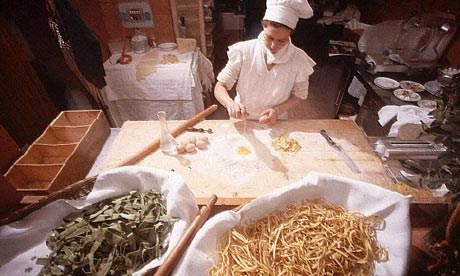
What do we talk about when we talk about food? For most of us the answer is probably food itself, with optional side dishes of nostalgia, tradition, hunger and sex. For David Winner, the principal answer seems to be lurid Italian films and the Catholic church.
Winner, a British writer who has lived in Rome for the past decade, sorts out this jumble of ideas in a series of intriguing and lively essays, making it clear from the off that, while food plays a major role in Roman life, it is not his subject matter but a unifying theme.
The result is something like a fusion of Coleridge's Table Talk and Marinetti's The Futurist Cookbook, peopled with eccentric film-makers, anorexic saints and wafer-making nuns. It is also in part, at least in the early chapters, a ramble round the city, and Winner is an entertaining guide – zestful and thoughtful in equal measure. There are handy tips: where to get the most gorgeous view, the most addictive ice cream, the sexiest tiramisu, slotted in between an interesting discussion about the invention of pasta as a national dish at the time of Italy's unification, or a knowing riff on Fellini's explicit use of the term al dente.
Winner's tour of Rome is so personal that it inevitably challenges expectations. He tickles the northern European tourist's hunger for linguine and sensuality by offering us first a chapter on pure water, quickly following up with an orgy of gustatory sex and death. His own experience of the country seems peculiarly devoid of communal eating, a deliberate riposte perhaps to the popular image of the big Italian family united, if only for a time, over homemade spaghetti and a gutsy ragù, although the odd Communist uncle and big-hearted grandma make a welcome appearance.
By the end, Winner has jettisoned his overarching food theme almost completely; a chapter called "The Fig and the Anchovy" is really a disquisition on the church's involvement in antisemitism; "The Spiral" is a calorie-free enquiry about Frank Lloyd Wright's debt to the Vatican's spiral staircase for his Guggenheim. Without the food metaphor the tension drops somewhat, leaving something rather more sombre, although the mood is revived by a postprandial encounter in a coffee house. By which point I was tempted to wonder whether it mattered anyway, as Winner had already put some far more important thoughts in my mind, such as when I could next get myself to Rome to find that tiramisu.
Pen Vogler is the editor of Penguin's Great Food series

